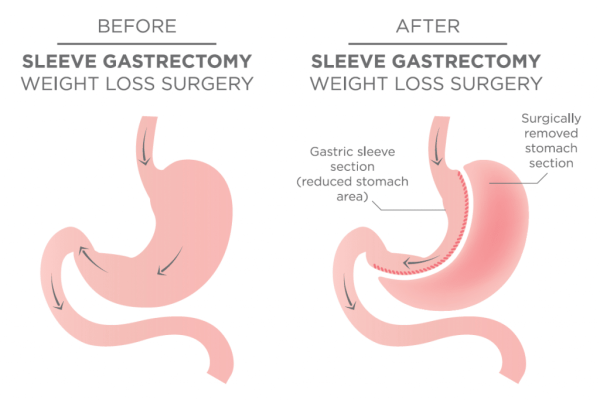Laparoscopic Sleeve Gastrectomy in Iran

How Does the Sleeve Gastrectomy Work?
Weight loss following sleeve gastrectomy occurs due to several reasons:
-
A reduction in the volume of food that can be consumed at a time
-
A significant reduction in the levels of Ghrelin, a hormone responsible for generating hunger; many patients also report a significant change in their food preferences, especially an aversion to sugars and carbohydrates
-
Inability of the residual stomach to expand, as the stretchable part of the stomach is removed and the part that is left behind is relatively less compliant. This makes the stomach able to accommodate a moderate intake of food but does not allow one to overeat
-
The passage of food through the stomach is accelerated leading to early satiety which reduces the intake without affecting the sense of satisfaction from eating
Preparation for the Gastric Sleeve Surgery
-
You must quit smoking before the surgery.
-
A few days before the surgery, you must stop taking Aspirin, Ibuprofen, and other blood thinners.
-
The night before the surgery, you must not eat anything.
-
2 weeks before the surgery, you must follow a specific diet.
-
It is recommended to take some medical tests such as blood tests, Endoscopy, an abdominal ultrasound, etc. to verify there is no ulcer in your stomach.
Post-op Gastric Sleeve Diet
Post-op diet is the most important part of any bariatric surgery. The patients must always care about what and how much they eat and even the liquids should be sipped. Otherwise, it can cause nausea and stomach pain. The patients must chew the food well and eat slowly, and they are not allowed to drink water and other drinks for half an hour before and after the meal. This way, there is enough time for sugar secretion and digestion and the patient will feel full sooner.
The patients can resume daily activities about 3-4 days after the surgery. They should eat drinks for 10 days. After that, they can eat soft pureed foods and after 2 weeks, they can gradually consume solid foods.
Laparoscopic Sleeve Gastrectomy in Iran
The surgery normally takes 2 – 3 hours under general anesthesia. The patient can leave the hospital after one or two nights and back to work after 2 – 3 weeks. The patient usually needs to stay in Iran for about 9 days to 2 weeks. The recovery time usually takes 1 – 3 months depending on the patient’s circumstances and how much he or she carefully follows the doctor’s instructions. It is recommended to bring a companion with you during the surgery as it will facilitate your stay in Iran.
Affordable Gastric Sleeve Cost in Iran
While the quality and efficacy of gastric sleeve surgeries in Iran as well as the patient satisfaction rate are very high, the cost of a gastric sleeve in Iran is among the lowest in the world.
The average cost of a gastric sleeve surgery in Iran is currently around $3000-$4000. The price may change for those who are above 130 kg. It also depends on the surgeon’s reputation and competence, the problem severity, the operation complexity, and similar issues. Our team at Iran Medical Tours offers gastric sleeve surgery packages with the best bariatric surgeons in Tehran, Mashhad, and Shiraz.
Who Is the Right Candidate for Sleeve Gastrectomy?
A Gastric Sleeve is suitable for overweight people with a BMI above 35 or 40 (extreme obesity) who have not been able to successfully lose weight by exercise, diet, or other non-surgical weight loss methods and struggle with serious weight-related health problems, such as type 2 diabetes, heart disease, or high cholesterol.
The surgery is usually recommended for gluttons who binge-eat- people who eat excessively on each meal and receive more calories than they need. These people usually prefer food rather than sweets, chocolate, and snacks, when feeling hungry.
It is recommended to consult a specialist to see which weight loss method is right for you and choose the best option.
Differences between a Gastric Sleeve and a Gastric Bypass
Among various types of bariatric surgeries, the gastric bypass and sleeve are the two most common.
The Sleeve surgery is restrictive and less invasive than the bypass and the Gastric Bypass is restrictive, malabsorptive, and more complicated. Bypass is usually recommended for people with high BMI, while gastric sleeve is recommended for people with lower BMI. Besides, the speed of weight loss is faster in gastric bypass.
While the Sleeve is better for people who eat main meals excessively, Bypass is recommended for those who prefer snacks and high-calorie edibles instead of main dishes. After the operation, these people still have an appetite but may suffer from malabsorption because a part of the small intestine is removed from the food absorption pass. As a result, the extra calories the patient receives will not be absorbed and they usually need to take multivitamins for life. Unlike gastric bypass, the sleeve gastrectomy does not reduce the absorption of nutrients.
Moreover, a portion of the stomach is removed in the gastric sleeve. While in gastric bypass, a small stomach pouch is created and the small bowel is re-routed.
Both methods require training, proper diet, and continuous care and follow-up to get the best result after the surgery that best suits the patient. To choose among various methods, different factors are considered by the doctor, mainly BMI, the patient’s diet, underlying diseases such as diabetes and gastroesophageal reflux, etc. Therefore, you should consult the surgeon to choose the best method regarding your circumstances.
Laparoscopic Sleeve Gastrectomy Risks and Complications
-
Minor side effects, such as pain, swelling, and bleeding (that will normally disappear after a few days)
-
Gastric leak, internal bleeding, gastritis, infection, nausea, and vomiting (rarely happens)
-
Vitamin deficiency
-
Reflux or heartburn
-
Sagging skin
-
Hair loss
How to Calculate Your Body Mass Index (BMI)?
To calculate BMI (Body Mass Index), you should divide your weight in kilograms by your height in meters squared. For example, if you weigh 70kg and are 1.73m tall, you work out your BMI by squaring your height: 1.73×1.73 = 2.99 dividing 70 (your weight) by 2.99 = 23.41.
If you have a BMI of 35 or higher, or a BMI between 30 and 35, and an obesity-related condition such as diabetes, high blood pressure, heart disease, etc. you may need obesity surgery.
